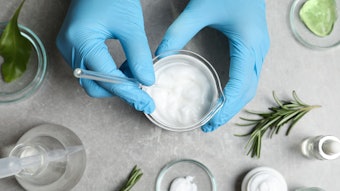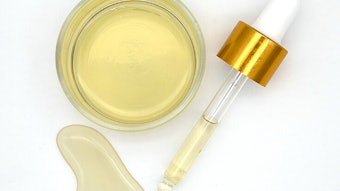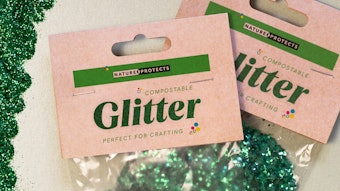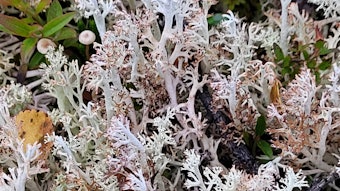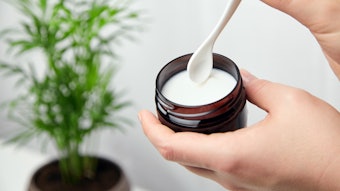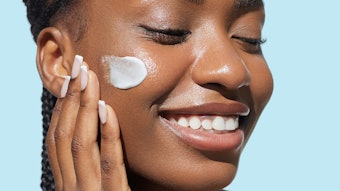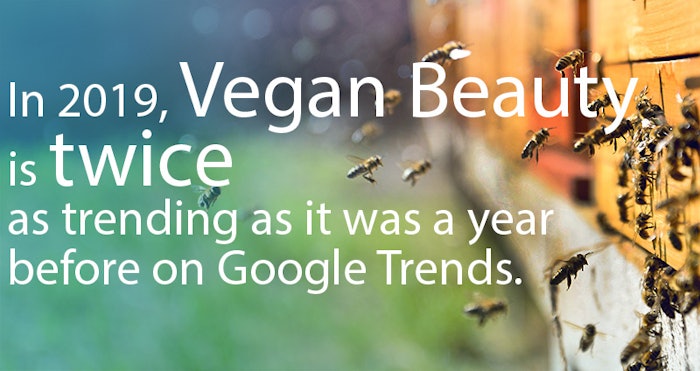
It’s no secret that natural beauty is quickly growing throughout the cosmetic industry. But what is interesting, is how consumers relate to and define these “natural” claims. With many green labels and certifications failing to create a consensus, many beauty addicts are turning their attention to claims more directly and meaningfully aligned with their convictions and lifestyles.
Among these natural-related claims, the vegan category is experiencing the fastest growth: according to the NPD group, in 2018, the vegan prestige beauty market has increased by 38%. As of early 2019, the term "Vegan Beauty" is trending twice as high as it was a year before on Google Trends.
Vegan cosmetic lovers are concerned about animal wellbeing, absence of animal testing, sourcing transparency, etc… Most recently, the growing alarm around a potential "beepocalypse" has been the focus of attention. Deforestation, excessive use of pesticides, proliferation of parasite species, and destruction of habitat are causing great harms to pollinator colonies. To put it simply: bees are a key element of our food supply. In California for instance, almond growers rely on the pollinator to insure the pollination of their crops, and many other industries do as well.
But specific actions can help protect bees and one inconspicuous plant could hold the key! In Arizona, the U.S. Department of Agriculture identified that jojoba, an indigenous crop that has been use for traditional medicine by native populations for centuries, can contribute to bee’s colony buildup when it blooms. While jojoba produces no nectar (the crop relies on wind, not bees, for pollination), it produces an abundant amount of yellow pollen during the spring in the Sonoran Desert area. Jojoba’s metabolic pathways are very different from other crops, impacting its unique oil composition, as well as its pollen, which is highly concentrated in proteins, and creates excellent feed to the whole colony, allowing bees to strive even in desertic areas.
Another way that jojoba can benefit bees is through its oil and derivatives. Using jojoba oil pressed from its farm in Arizona, Vantage has created Jojoba Wax Flakes™, a high melting point wax with a melting point and properties similar to beeswax, making it an incredible natural and sustainable alternative for vegan formulations.
 Image 1: Jojoba Wax Flakes™ can be used to create a beeswax-free Highlighting Stick that glides effortlessly thanks to Lipovol™ G and Jojoba Wax™ Flakes.
Image 1: Jojoba Wax Flakes™ can be used to create a beeswax-free Highlighting Stick that glides effortlessly thanks to Lipovol™ G and Jojoba Wax™ Flakes.To learn more about how sustainable jojoba oil and Jojoba Flakes™ can improve your formulations, visit:
https://www.vantagegrp.com/webforward/personal-care/content/desert-whale-jojoba-oil-derivatives
Disclaimer:
The above paid-for content was produced by and posted on behalf of the Sponsor. Content provided is generated solely by the Sponsor or its affiliates, and it is the Sponsor’s responsibility for the accuracy, completeness and validity of all information included. Cosmetics & Toiletries takes steps to ensure that you will not confuse sponsored content with content produced by Cosmetics & Toiletries and governed by its editorial policy.

